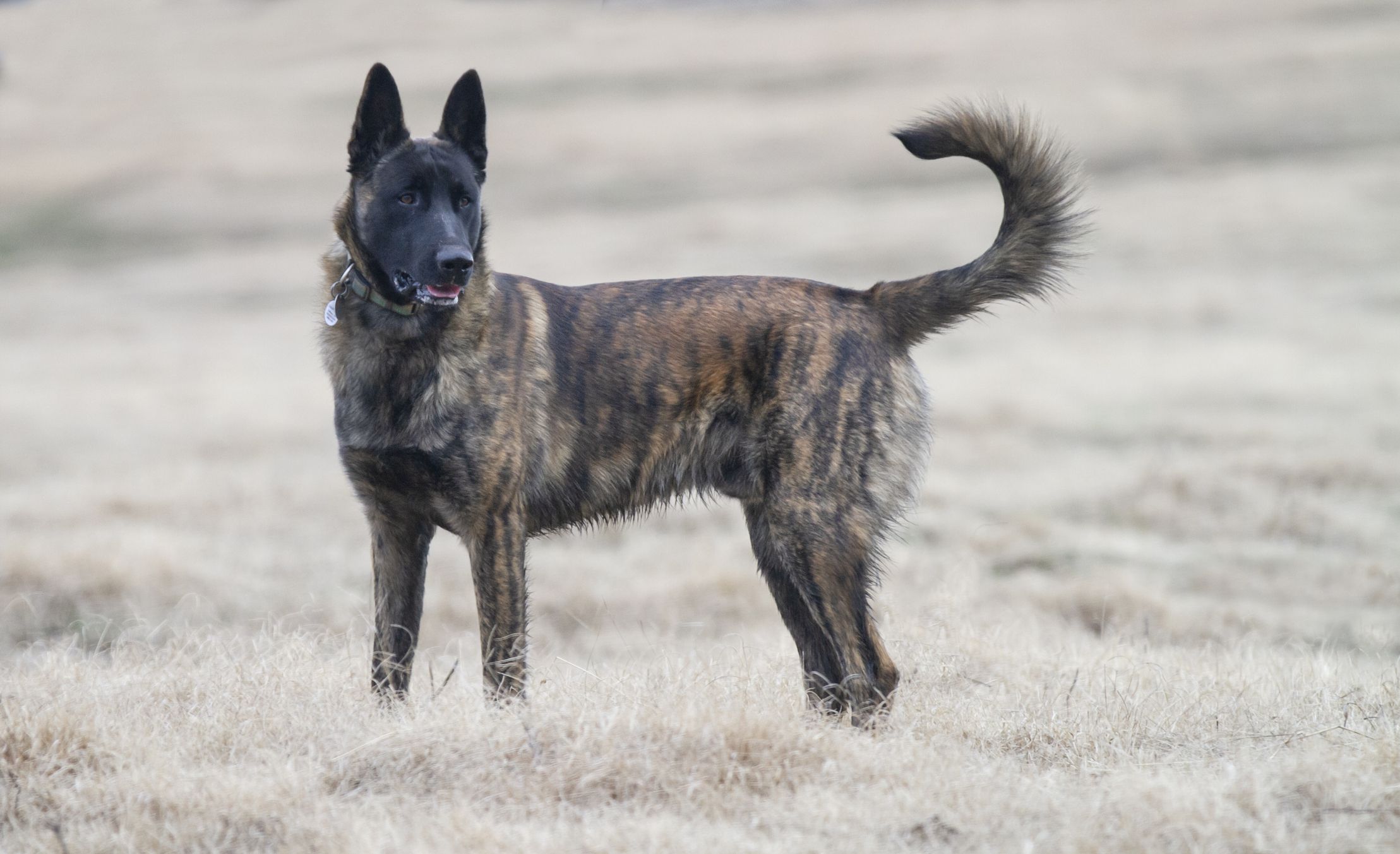Are you considering getting a Dutch Shepherd breed dog as your next pet? If so, you’re in for a treat. Dutch Shepherds are a highly intelligent, loyal, and active breed that make great family pets for those who are willing to put in the time and effort to properly train and socialize them. Originally bred for herding and guarding, Dutch Shepherds are known for their athleticism, agility, and strong work ethic. They have a unique appearance with their brindle coat and pointed ears, and are often compared to their more well-known cousin, the German Shepherd. If you’re looking for a dog that will keep you on your toes and be a devoted companion, a Dutch Shepherd might be the perfect match for you.
Breed Category: Herding
Country of Origin: Netherlands
Average Size:55-62 cm
Average Weight:23-32 kg
Average Life Span: 11-14 years
Grooming Requirements: Moderate
Exercise Requirements:High
History and Origin
The Dutch Shepherd is a breed of dog that originated in the Netherlands. The breed was developed in the early 1800s to be a versatile working dog that could herd sheep, guard livestock, and protect the home. The Dutch Shepherd is a medium-sized dog that is known for its intelligence, loyalty, and athleticism.
The Dutch Shepherd is believed to have descended from a variety of herding dogs that were brought to the Netherlands by Germanic tribes. These dogs were bred with local dogs to create a breed that was well-suited to the Dutch landscape and climate. The Dutch Shepherd was originally used as a farm dog, but its versatility soon made it popular with law enforcement and the military.
During World War II, the Dutch Shepherd was used by the Dutch resistance to help smuggle people and supplies across the border. The breed’s intelligence and loyalty made it an ideal choice for this dangerous work. After the war, the Dutch Shepherd became popular with police departments and the military around the world.
The Dutch Shepherd is a highly trainable dog that excels in a variety of activities, including obedience, agility, and tracking. The breed is also known for its strong protective instincts, which make it an excellent guard dog. The Dutch Shepherd is a loyal and affectionate companion that is devoted to its family.
Today, the Dutch Shepherd is still used as a working dog in the Netherlands and other parts of Europe. The breed is also popular with dog enthusiasts around the world who appreciate its intelligence, athleticism, and loyalty. The Dutch Shepherd is recognized by the United Kennel Club and the American Kennel Club, and there are several breed clubs dedicated to promoting and preserving the breed.
In conclusion, the Dutch Shepherd is a breed of dog that has a rich history and a strong connection to the Netherlands. The breed’s versatility, intelligence, and loyalty have made it a popular choice for working dogs and family pets alike. Whether you are looking for a dog to help you on the farm or a loyal companion to share your life with, the Dutch Shepherd is a breed that is well worth considering.
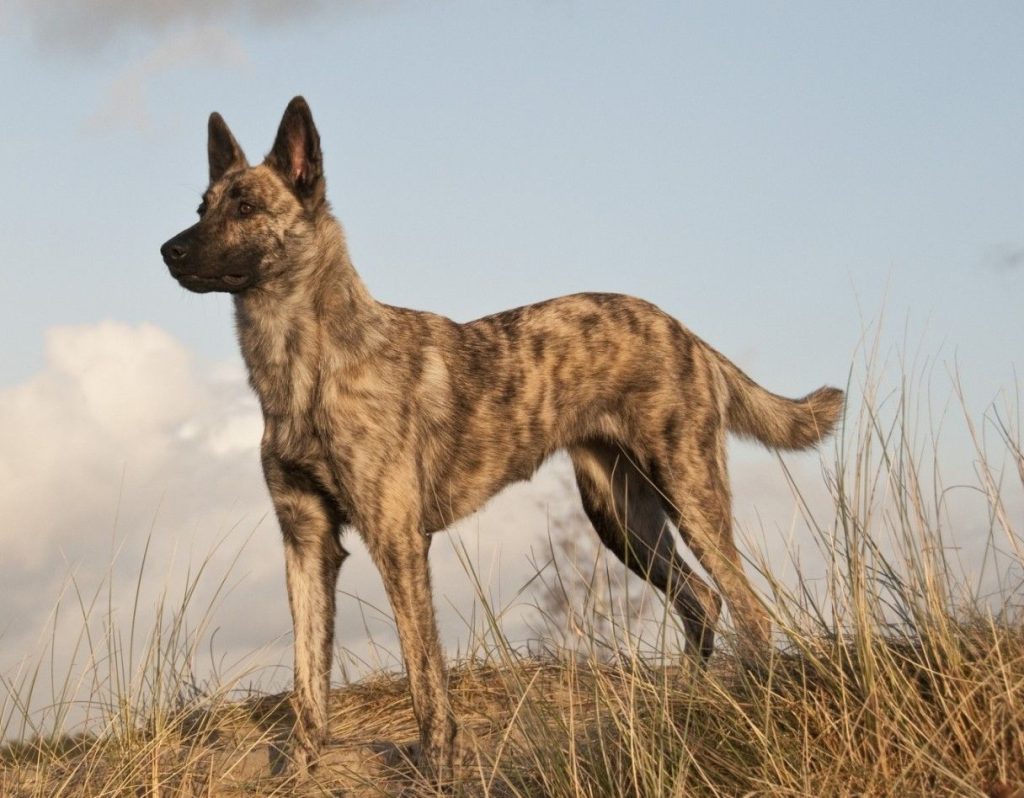
Size and Breed Category
The Dutch Shepherd is a medium-sized breed of dog that originated in the Netherlands. They are known for their athleticism, intelligence, and versatility. The breed is classified as a herding dog and is often used for police work, search and rescue, and as a family companion.
The Dutch Shepherd typically stands between 21-25 inches (53-63 cm) tall at the shoulder and weighs between 50-70 pounds (23-32 kg). They have a muscular build and a short, dense coat that can come in a variety of colors including brindle, black, and blue. The breed is known for their high energy levels and requires plenty of exercise and mental stimulation to stay happy and healthy. They are also highly trainable and excel in obedience and agility competitions.
Fur Length and Colour
The fur of the Dutch Shepherd is typically medium in length, with a dense undercoat and a coarser outer coat. The fur is straight and lies close to the body, providing excellent protection against the elements. The fur on the neck and shoulders is slightly longer, giving the dog a distinctive mane-like appearance. The fur on the tail is also longer and bushy, adding to the dog’s overall appearance. The fur can come in a variety of colours, including brindle, black, blue, and fawn. Some Dutch Shepherds may also have white markings on their chest and feet. The fur is easy to maintain with regular brushing and occasional bathing.
The colour of the Dutch Shepherd’s fur can vary depending on the individual dog. Brindle is a common colour, with a mix of black and brown stripes. Black is also a popular colour, with a shiny, jet-black coat. Blue is a less common colour, with a greyish-blue coat. Fawn is another colour option, with a light brown coat. The fur may also have a mixture of colours, such as black and tan or black and silver. The colour of the fur can be an important factor for breeders and owners, as it can affect the dog’s appearance and overall value. However, the most important aspect of the Dutch Shepherd’s fur is its quality and density, which provides protection and warmth for the dog in all types of weather.
Termperament and Trainability
Dutch Shepherds are known for their high energy and drive, making them an excellent choice for active owners who enjoy outdoor activities. They are intelligent and eager to please, which makes them highly trainable. However, their strong will and independence can sometimes make them challenging to train, especially for inexperienced owners. It is important to establish a firm and consistent training routine from an early age to ensure that they develop good habits and behaviours. Dutch Shepherds are also highly social and thrive on human interaction, so it is essential to provide them with plenty of attention and affection.
In terms of temperament, Dutch Shepherds are typically confident and assertive, which can make them excellent guard dogs. They are loyal and protective of their family, but they can also be wary of strangers. Early socialisation is crucial to ensure that they are comfortable around new people and situations. Dutch Shepherds are also highly active and require plenty of exercise and mental stimulation to prevent boredom and destructive behaviour. They excel in activities such as agility, obedience, and tracking, and they are often used in law enforcement and search and rescue operations. Overall, Dutch Shepherds are a highly versatile breed that requires an experienced and dedicated owner who can provide them with the training and attention they need to thrive.

Known Health Conditions
Dutch Shepherds are a breed of dog that are known to be prone to certain health conditions. One of the most common health issues that Dutch Shepherds face is hip dysplasia. This is a condition where the hip joint does not develop properly, leading to pain and discomfort for the dog. It can also cause arthritis and mobility issues later in life. To prevent hip dysplasia, it is important to ensure that Dutch Shepherds are not over-exercised as puppies and that they maintain a healthy weight throughout their lives. Regular exercise and a balanced diet can also help to prevent this condition.
Another health condition that Dutch Shepherds are prone to is epilepsy. This is a neurological disorder that can cause seizures in dogs. Epilepsy can be genetic, so it is important to ensure that any breeding dogs are screened for this condition. If a Dutch Shepherd is diagnosed with epilepsy, medication can be prescribed to help manage the seizures. It is important to work closely with a veterinarian to ensure that the medication is effective and that the dog is not experiencing any negative side effects. Regular check-ups and monitoring can help to ensure that the dog is managing their condition well.
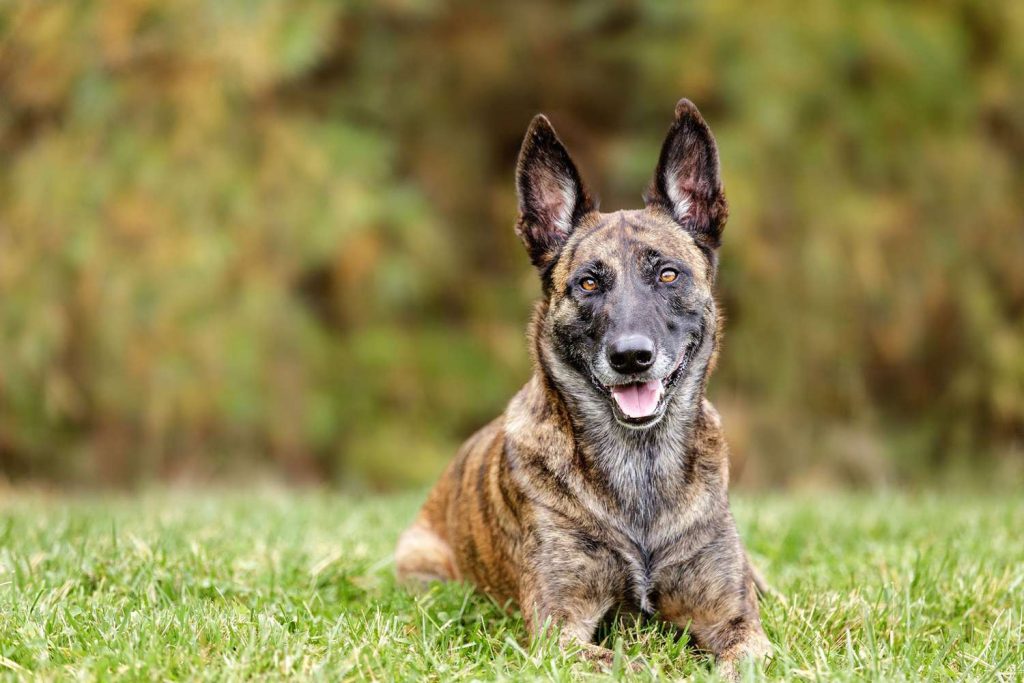
Openness to Strangers
Dutch Shepherds are known for their friendly and welcoming nature towards strangers. They are a breed that is naturally curious and enjoys meeting new people. This makes them great companions for those who enjoy socializing and having guests over. Their open and approachable demeanor also makes them great therapy dogs, as they are able to put people at ease and make them feel comfortable. Additionally, their intelligence and trainability make them great candidates for service dog work.
When it comes to meeting new people, Dutch Shepherds are not typically aggressive or fearful. They are confident and self-assured, which allows them to approach new situations with ease. However, it is important to note that like all dogs, they should be properly socialized and trained to ensure that they are well-behaved around strangers. With the right training and socialization, Dutch Shepherds can make wonderful family pets and loyal companions. Their friendly and open nature towards strangers is just one of the many reasons why they are beloved by so many dog owners.
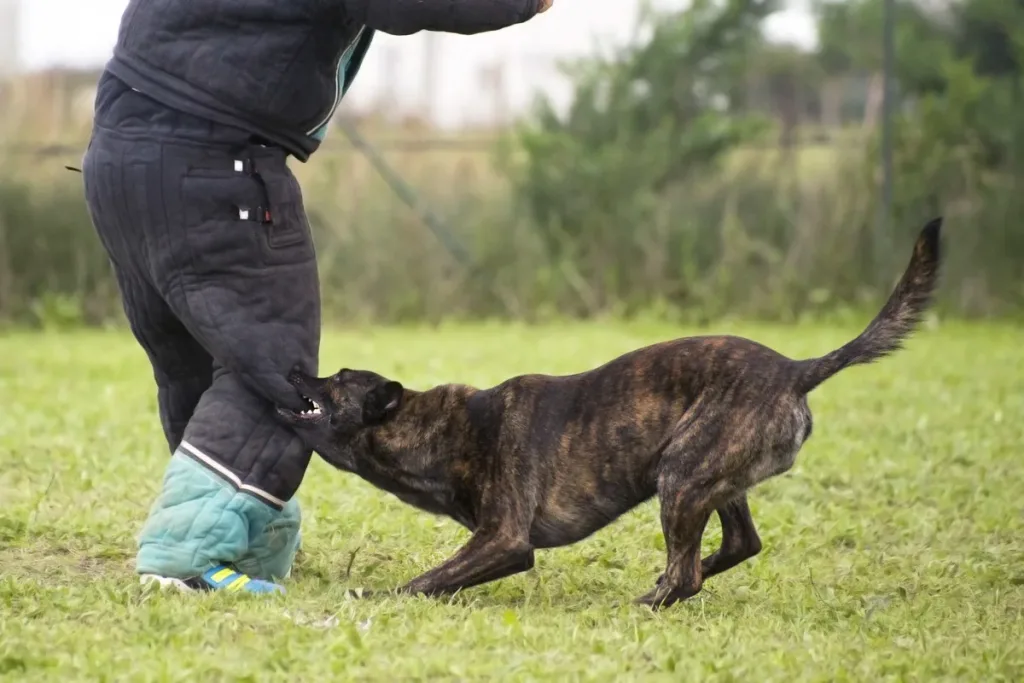
Playfulness Level
The Dutch Shepherd is a highly energetic and playful breed of dog. They are known for their love of play and their ability to keep up with even the most active of owners. This breed is always up for a game of fetch or a run in the park, and they thrive on physical activity. Their playful nature makes them a great choice for families with children, as they love to play and interact with people of all ages.
The Playfulness Level of the Dutch Shepherd is one of their defining characteristics. They are always eager to play and have fun, and they have a natural curiosity that drives them to explore their surroundings. This breed is highly intelligent and loves to learn new things, so they are always up for a challenge. Whether it’s playing a game of hide and seek or learning a new trick, the Dutch Shepherd is always ready to have fun and engage with their owners. Their playful nature makes them a joy to be around, and they are sure to bring a smile to the face of anyone who spends time with them.
Suitability as a Pet for Children
Dutch Shepherds are known for their high energy levels and intelligence. They are a versatile breed that can excel in various activities such as obedience, agility, and tracking. Their loyalty and protective nature make them great family pets, especially for children who are active and enjoy outdoor activities. Dutch Shepherds require regular exercise and mental stimulation to prevent boredom and destructive behavior. They are easy to train and respond well to positive reinforcement. However, their strong prey drive may make them unsuitable for households with small pets.
Exercise Needs
Dutch Shepherds are highly active dogs that require plenty of exercise to maintain their physical and mental health. As a medium-sized breed, they need at least 60 minutes of daily exercise, which can be achieved through a combination of walks, runs, and playtime. These dogs have a high energy level and love to be outdoors, so they are well-suited for owners who enjoy an active lifestyle. In addition to physical exercise, Dutch Shepherds also benefit from mental stimulation, such as training sessions and interactive toys. This helps to prevent boredom and destructive behavior, as well as strengthen the bond between the dog and owner.
Due to their working heritage, Dutch Shepherds excel in activities such as agility, obedience, and herding trials. These activities not only provide physical exercise but also mental stimulation, as the dog must use their problem-solving skills to complete the tasks. Owners should also be aware that Dutch Shepherds have a strong prey drive and may chase small animals, so it is important to keep them on a leash or in a secure area. Overall, Dutch Shepherds are a highly active breed that require plenty of exercise and mental stimulation to thrive. With the right amount of activity and attention, they make loyal and loving companions for active families.
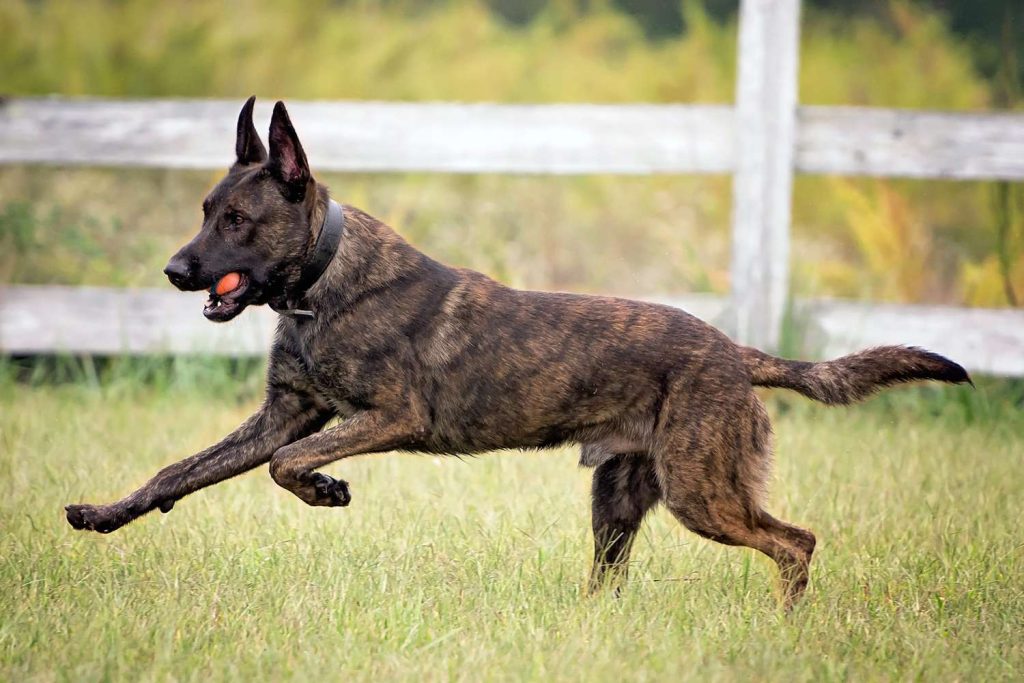
Suitability for a Multi-Pet Family
Dutch Shepherds have been known to coexist peacefully with other pets in the household. They are generally social animals and can adapt well to living with other animals, including cats and other dogs. However, as with any breed, early socialization and training are important to ensure that they learn to interact appropriately with other pets. It is also important to supervise interactions between pets to prevent any potential conflicts.
Housing Requirements
Dutch Shepherds require a spacious and secure living environment. They are an active breed that needs plenty of room to move around and exercise. A large, fenced yard is ideal for them to run and play in. They also need a comfortable indoor space to rest and sleep in. A cozy dog bed or crate is recommended for them to feel safe and secure. It is important to provide them with plenty of toys and mental stimulation to prevent boredom and destructive behavior. Additionally, Dutch Shepherds thrive on human interaction and should not be left alone for long periods of time.
Proper nutrition is essential for the health and well-being of Dutch Shepherds. They require a balanced diet that is high in protein and low in fat. It is recommended to feed them a high-quality dog food that is appropriate for their age and activity level. Fresh water should be available to them at all times. Dutch Shepherds also require regular grooming to maintain their coat and skin health. Brushing their coat weekly and bathing them as needed will help keep them clean and healthy. Regular veterinary check-ups and vaccinations are also important to ensure their overall health and prevent any potential health issues.
Summary
Dutch Shepherds have a reputation for being highly intelligent and trainable, making them a great choice for experienced dog owners who are looking for a pet that can be trained to perform a variety of tasks. They are also known for their loyalty and protective nature, which makes them a good choice for families with children. However, their high energy levels mean that they require plenty of exercise and stimulation, so they may not be suitable for people who are unable to provide them with the attention and exercise they need.
Dutch Shepherd Dog FAQS
Yes, Dutch Shepherds are highly intelligent and trainable, but they require consistent and firm training.
Yes, Dutch Shepherds are excellent guard dogs and have a strong protective instinct.
Yes, Dutch Shepherds are known to be great with children and make excellent family pets.
Dutch Shepherds are generally healthy dogs, but they may be prone to hip dysplasia and eye problems.
Dutch Shepherds have a short, dense coat that requires minimal grooming, but they do need regular brushing to control shedding.
Yes, Dutch Shepherds shed moderately throughout the year and heavily during shedding season.
Dutch Shepherds have a lifespan of 11-14 years on average.
Dutch Shepherds are high-energy dogs and require at least 1-2 hours of exercise daily.
A Dutch Shepherd can grow up to 60-65 cm in height.
The average weight of a Dutch Shepherd is between 25-32 kg.
